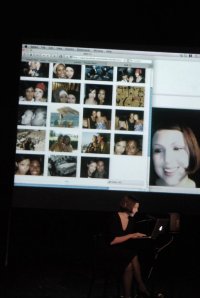The term social networks now largely refers to our online activities on major news-sharing, picture-sharing, CV-sharing, life-sharing, what-not-sharing websites. These are so popular listing them seems a waste of online space.
What happened to Neanderthals?
Yesterday’s (12 March) science news were all about another type of social networks and their place in human survival kit. BBC Science, Huff Post Science, New Scientist – all had this discovery announced: ‘Neanderthals had relatively less space for the frontal lobe, a brain region that controls social thinking and cultural transmission,’ (Huff Post) which could have led to their extinction.
Apparently, Neanderthals had bigger eyes and relied more on their vision than humans. So researchers concluded that their brain space, used in humans for social intelligence, was taken up to accommodate that superior vision. This stopped them from building bigger and more productive groups, which led to their underdeveloped social networks.
Are we social or are we networking?
The relation between social skills and social thinking is obvious – one needs to be able to think socially in order to develop appropriate social skills. The question is – do online social networks help with either?
Given that social thinking and skills require a group of people interacting regularly, preferably in real time and with the ability to see each other. These gays Gmail and Skype provide us with this, but do they replace a real human connection and bonding?
Say a person spent his/her life dating only online , but using online camera instead of a text chat. Would it be easy for him/her to then go on a regular date in a crowded restaurant? Would the setting change his/her perception of this kind of human contact? Would it enhance or destroy this experience? What would the outcome be: another date or ‘I wish I haven’t bothered with two rammed trains and a bus-ride to the other side of London just for this!’
With a constant development of online social networks, are we losing or bettering our social skills? ‘According to a study released by the Pew Internet and American Life Project, the size of the average American’s social circle is smaller today than 20 years ago‘, reports Central Michigan Life, 2009.
How vital are these social skills?
If the lack of social networks could cause the entire species go extinct, isn’t this the time to think about how we should continue developing our old-neighbourhood kind of attitude and try working on our daily communication? Children with Autism, for example, receive a lot of valuable help, while working so much harder on increasing their abilities to interact with people around them. This means that with a good help the skills are acquirable , but why would one need to forget something so vital for the entire mankind?
The other day at a GP waiting lounge only one person out of a dozen present first looked around the enitere room, then stopped to read a poster on flu prevention hanging of a yellowish wall. The rest were not really there – all had their smartphones and iPads out googling, tweeting, facebooking and skyping. Although the bodies were present in that launch, their minds were somewhere else. The lounge didn’t feel like it was full of people. It felt like it was full of Zombies.
It’s hard to disagree with the fact that social networks are very inspiring, the problem with them is – they are all about online, making it harder and harder for people to bravely submerge into a social milieu and face that challenging ‘dealing with real people’. So, let’s hope this modern comfort zone won’t lead to our slow decay.

